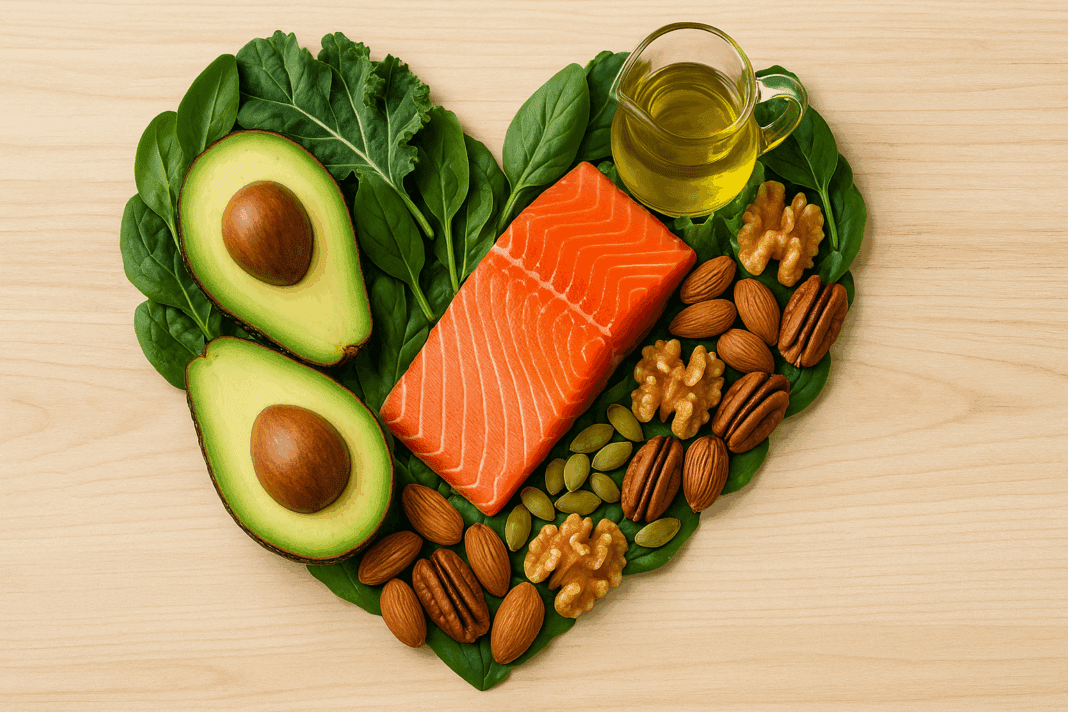The ketogenic diet has earned widespread attention for its potential to promote weight loss, regulate blood sugar, and even improve cognitive function. But beyond these popular benefits, a growing body of research suggests that a free keto diet plan may also offer important support for heart health, particularly for individuals managing high cholesterol. While the phrase “high fat” might seem contradictory to cardiovascular wellness at first glance, deeper exploration reveals that not all fats are created equal, and a well-formulated ketogenic approach can be tailored to improve lipid profiles, reduce inflammation, and lower risk factors associated with heart disease. Understanding how to implement expert-recommended ketogenic meal plans for high cholesterol is essential for maximizing the cardiovascular benefits of this dietary strategy while minimizing potential risks.
You may also like: Is the Keto Diet Safe or Dangerous? What Experts Say About the Risks, Benefits, and Basics of the Ketogenic Diet

Understanding the Relationship Between Keto and Cardiovascular Health
To begin, it’s crucial to acknowledge that cardiovascular disease remains the leading cause of death globally, with high cholesterol being a key modifiable risk factor. Traditional dietary advice has long emphasized low-fat consumption to reduce cholesterol and protect the heart. However, emerging studies have started to challenge this paradigm, revealing that the quality and source of fats may be more influential than total fat intake alone. In this context, a carefully structured ketogenic diet that prioritizes healthy fats, such as those from avocados, nuts, seeds, and olive oil, may have a beneficial effect on heart health.
The ketogenic diet operates on the principle of inducing a state of nutritional ketosis, where the body burns fat instead of carbohydrates for fuel. This metabolic shift not only helps with weight loss—a critical factor in reducing cardiovascular risk—but also influences lipid metabolism in more nuanced ways. While some individuals may experience an initial rise in LDL cholesterol on a ketogenic diet, others find that LDL particle size shifts toward the less atherogenic, larger particles, and HDL (“good” cholesterol) often increases. Moreover, triglyceride levels tend to decline, which is a favorable outcome for heart health.
Scientific studies have begun to document these effects. For instance, a 2020 review in the journal Nutrition highlighted that low-carbohydrate diets, including ketogenic variations, consistently reduce triglyceride levels and increase HDL cholesterol. These shifts, particularly when accompanied by weight reduction, suggest that ketogenic meal plans for high cholesterol may not only be safe for some individuals but may actually offer measurable cardiovascular benefits. However, personalization and medical oversight remain essential.
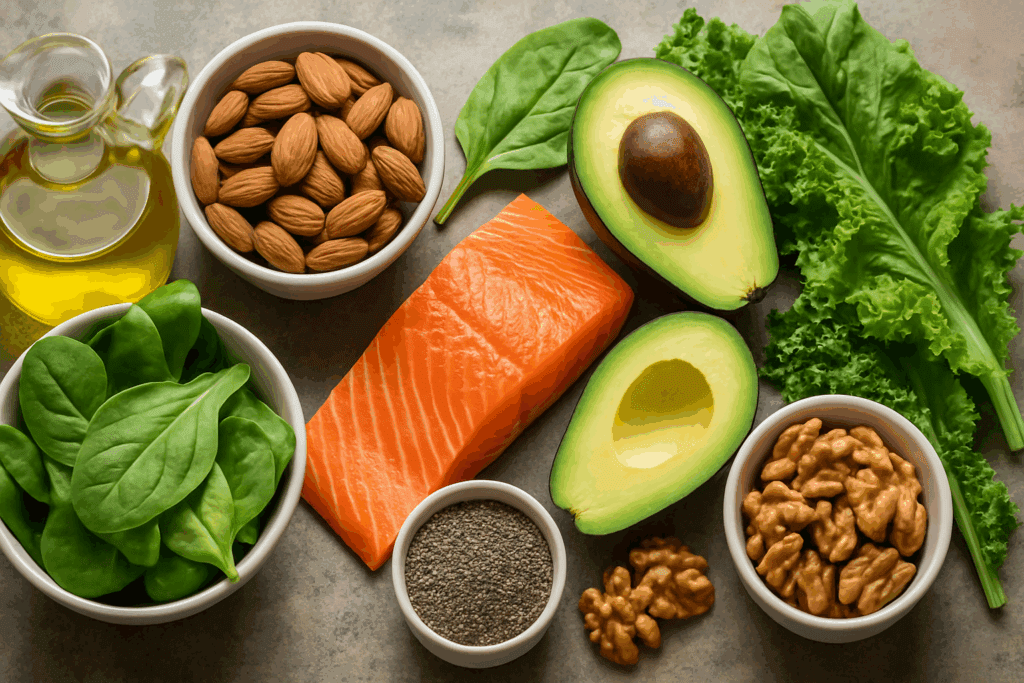
Key Components of a Heart-Healthy Keto Diet
For those considering a free keto diet plan with cardiovascular goals in mind, the first and most important principle is quality over quantity. The fats included in ketogenic meals must predominantly come from unsaturated sources. Monounsaturated fats, found in olive oil, avocados, and certain nuts, are known for their protective effects on the heart. Polyunsaturated fats, particularly omega-3 fatty acids from fatty fish like salmon and sardines, also play a pivotal role in reducing inflammation and improving endothelial function.
Equally important is the avoidance of trans fats and excessive intake of saturated fats. While the keto diet naturally leans into fat consumption, individuals with high cholesterol should be cautious about their sources. Red meat, butter, and full-fat dairy can be included in moderation but should not form the foundation of every meal. Instead, a well-balanced example of ketogenic diet meal plan might include grilled salmon with steamed broccoli and olive oil, a spinach salad with avocado and walnuts, or a chia seed pudding with unsweetened almond milk and berries.
Fiber intake, often overlooked in ketogenic circles, also plays a central role in cholesterol management. Soluble fiber, in particular, helps to reduce LDL levels by binding to cholesterol in the digestive tract and promoting its excretion. Incorporating keto-friendly fiber sources like chia seeds, flaxseeds, avocados, and leafy greens into daily meals can help support both digestive and cardiovascular health.

The Role of a Free Keto Diet Plan in Everyday Wellness
One of the most empowering aspects of adopting a ketogenic lifestyle is the ability to do so without incurring significant financial burden. A free keto diet plan, especially when built around whole, unprocessed ingredients, is not only accessible but also effective in supporting heart health. Beans and legumes, while often restricted on strict keto plans, can be included in moderation in more liberal versions and offer fiber and micronutrients that complement cardiovascular wellness. Similarly, canned fish, eggs, frozen vegetables, and pantry staples like olive oil can be incorporated into meal planning without breaking the bank.
Meal prepping is an excellent strategy to maintain adherence to a free keto diet plan. Taking the time each week to plan and prepare heart-healthy keto meals ensures consistent nutrient intake and minimizes reliance on processed or convenience foods, which often contain hidden sugars and unhealthy fats. For example, preparing a batch of egg muffins with spinach and tomatoes, or portioning out servings of roasted cauliflower with tahini dressing, can make daily adherence more manageable.
Digital resources have also expanded the reach of heart-friendly ketogenic meal planning. Websites, mobile apps, and online forums offer numerous templates, recipes, and community support for those following ketogenic meal plans for high cholesterol. Many of these platforms provide customizable tools that help align keto principles with individual dietary preferences and health goals, making personalized heart health strategies more attainable than ever.
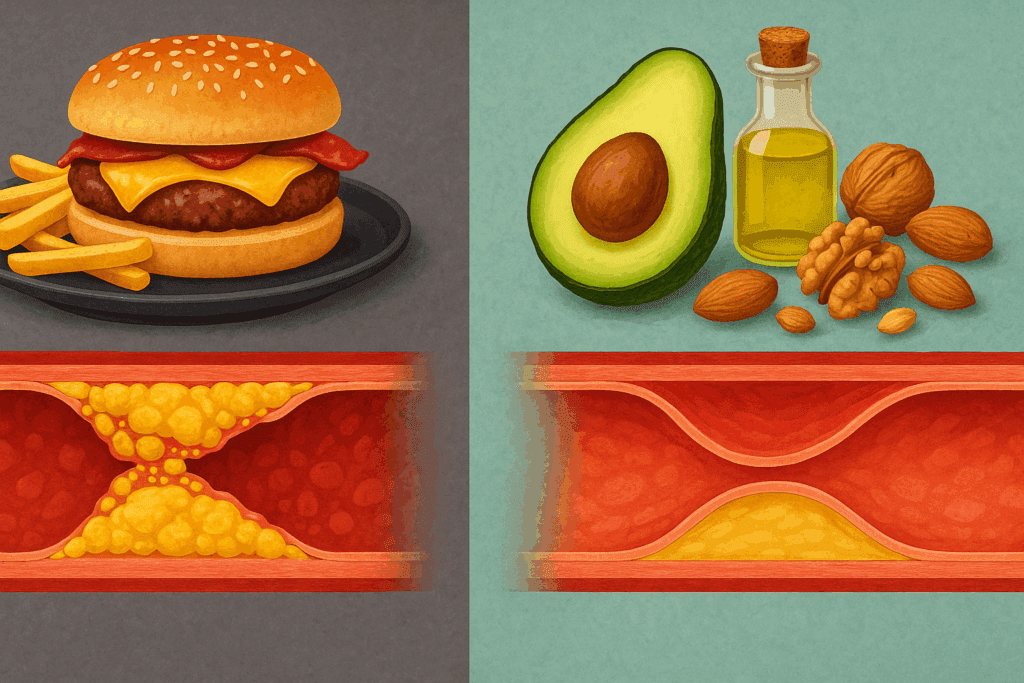
Debunking Myths About Fat and Cholesterol on Keto
Despite increasing acceptance in clinical nutrition, myths about the ketogenic diet persist, especially in relation to cholesterol and heart disease. One of the most common misconceptions is that eating more fat automatically raises cholesterol to dangerous levels. In reality, the relationship is far more complex. Dietary cholesterol has a relatively modest effect on blood cholesterol in most individuals. In fact, endogenous cholesterol production in the liver is often more significantly influenced by carbohydrate intake and insulin levels than by dietary fat consumption.
It is also important to distinguish between different types of LDL cholesterol. While total LDL levels may rise on a ketogenic diet for some people, advanced lipid testing often reveals that the number of small, dense LDL particles—those most strongly associated with plaque formation—actually decreases. At the same time, HDL levels usually increase, and triglycerides often fall dramatically. This combination, often referred to as improved lipid ratios, is associated with a lower risk of cardiovascular events.
However, individual variability matters. Some people, particularly those with a genetic predisposition to hypercholesterolemia or other lipid disorders, may see unfavorable changes on a high-fat diet. This is why expert-recommended ketogenic meal plans for high cholesterol should always be adapted to the individual and monitored by a healthcare professional. Regular blood tests, lipid panels, and physician consultations are essential to ensuring that a ketogenic diet remains heart-supportive rather than harmful.

Expert Recommendations for High Cholesterol Management on Keto
Experts in cardiometabolic health emphasize that not all ketogenic approaches are equal. A poorly designed keto diet that focuses heavily on processed meats, butter, and cheese may do more harm than good for those managing high cholesterol. Instead, experts advocate for a Mediterranean-inspired keto approach that combines the metabolic benefits of ketosis with the cardiovascular protections of the Mediterranean diet. This fusion emphasizes vegetables, lean proteins, nuts, seeds, olive oil, and seafood, aligning with evidence-based recommendations for lipid control and heart health.
Another key recommendation is to pair a ketogenic diet with lifestyle strategies that amplify its benefits. Regular physical activity, even in the form of brisk walking or resistance training, improves insulin sensitivity and lipid metabolism. Stress management, through mindfulness or meditation, can also positively influence heart rate variability and inflammation. Sleep hygiene, often underappreciated, plays a role in hormonal regulation and metabolic health, both of which impact cholesterol levels.
Monitoring biomarkers is a best practice endorsed by health professionals when following ketogenic meal plans for high cholesterol. Beyond standard lipid panels, advanced tests such as ApoB levels, lipoprotein particle counts, and inflammatory markers like C-reactive protein (CRP) can provide deeper insights into cardiovascular risk. These data points help guide dietary adjustments and ensure that heart health is being supported at a cellular level.
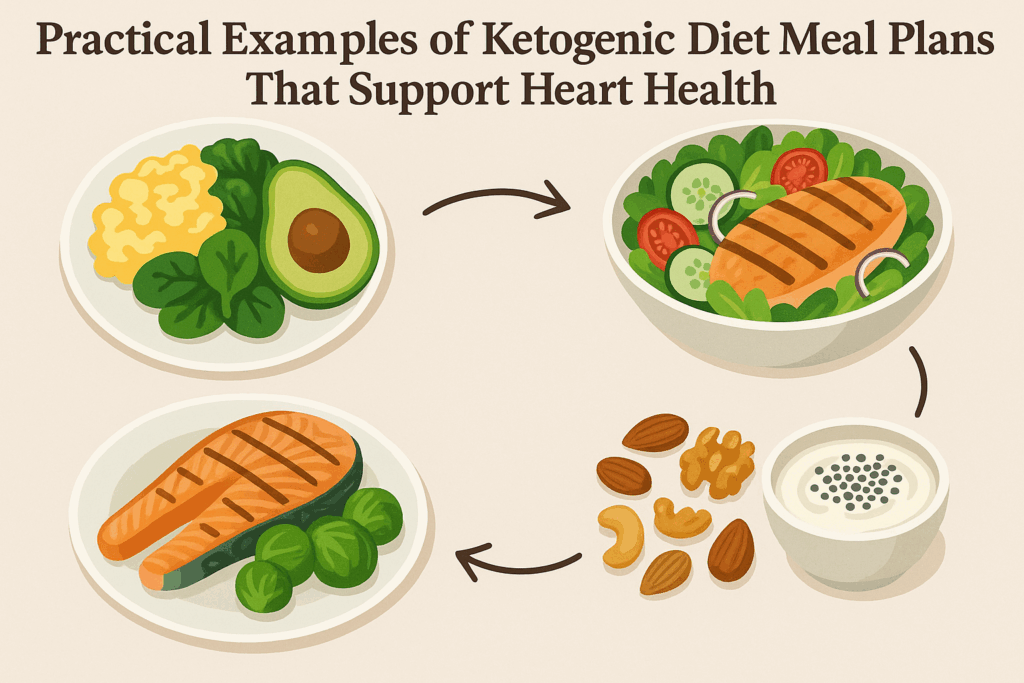
Practical Examples of Ketogenic Diet Meal Plans That Support Heart Health
Crafting a heart-conscious example of ketogenic diet meal plan involves a balance of macronutrients, nutrient-dense ingredients, and culinary creativity. For breakfast, a plate of scrambled eggs cooked in olive oil with sautéed spinach and a side of sliced avocado provides healthy fats, fiber, and antioxidants. Lunch might feature grilled chicken breast over a bed of mixed greens with walnuts, cucumber, and a vinaigrette made from lemon juice and extra virgin olive oil. For dinner, baked salmon seasoned with herbs, served alongside roasted Brussels sprouts and mashed cauliflower with garlic, offers omega-3s and fiber-rich vegetables.
Snacking on a ketogenic plan can be both satisfying and heart-healthy. Celery sticks with almond butter, a handful of mixed nuts, or Greek yogurt with chia seeds and a few berries provide nutrients and satiety without spiking insulin or blood sugar. These options support cardiovascular health while keeping the body in a state of ketosis.
Importantly, hydration and electrolyte balance must not be overlooked. Because the keto diet has a diuretic effect, replenishing sodium, potassium, and magnesium becomes essential. These minerals also support cardiovascular function and help prevent symptoms such as fatigue, palpitations, or cramps, which can arise when transitioning into ketosis. A focus on mineral-rich foods like leafy greens, seeds, and avocados—along with occasional supplementation when needed—rounds out a truly heart-smart ketogenic strategy.
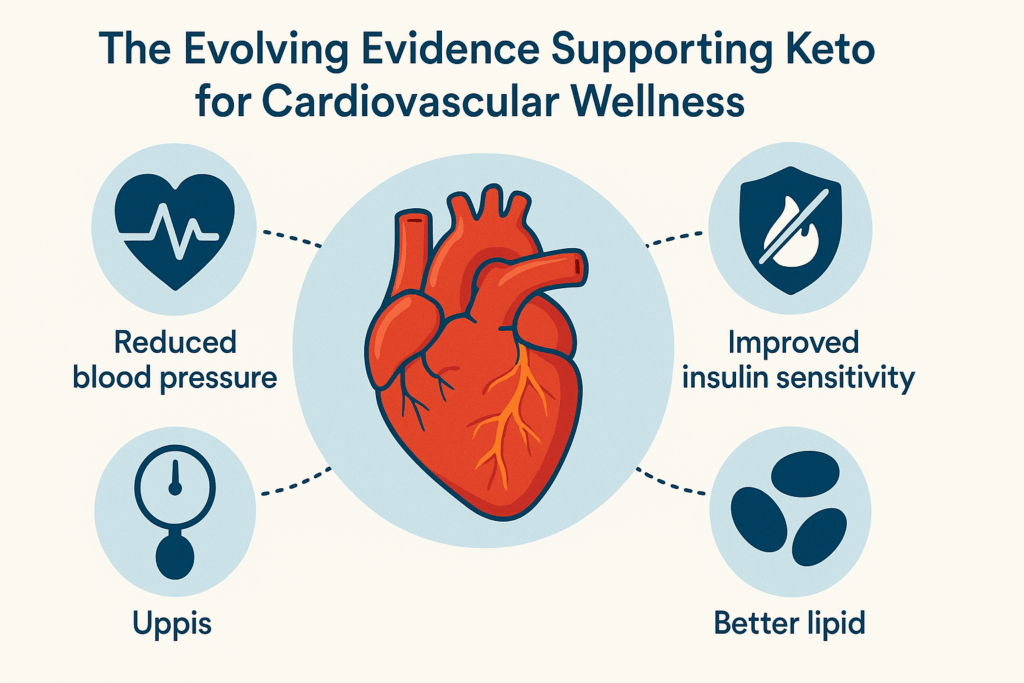
The Evolving Evidence Supporting Keto for Cardiovascular Wellness
In recent years, medical journals and conferences have increasingly featured discussions on the cardiovascular implications of ketogenic diets. A growing number of clinicians are acknowledging that a ketogenic dietary pattern, when properly implemented, does not inherently raise cardiovascular risk and may, in fact, confer protection in some populations. Longitudinal studies have shown that individuals following well-balanced keto diets experience improvements in body composition, blood pressure, inflammation markers, and insulin sensitivity—all of which contribute to reduced cardiovascular risk.
Furthermore, research into ketogenic therapies for metabolic syndrome, prediabetes, and type 2 diabetes has revealed collateral benefits for the heart. Given the strong link between insulin resistance and atherosclerosis, interventions that reduce insulin and blood glucose levels can have far-reaching effects beyond glycemic control. For patients with overlapping metabolic and cardiovascular concerns, ketogenic meal plans for high cholesterol may represent a strategic, multifaceted intervention.
However, the importance of ongoing research and personalized care cannot be overstated. Nutritional science continues to evolve, and individual responses to dietary interventions vary widely. What works for one person may not work for another, particularly when genetics, microbiome composition, and lifestyle differences come into play. As such, the ketogenic diet should be seen not as a universal solution, but as a tool—one that must be wielded with clinical insight, individualized tailoring, and a commitment to long-term monitoring.
Frequently Asked Questions: How a Free Keto Diet Plan Can Support Heart Health
1. Can ketogenic diets be adapted for people who are plant-based or vegetarian and still manage high cholesterol? Absolutely. A well-formulated plant-based keto diet can align with cardiovascular goals, even when managing high cholesterol. Instead of relying on animal-based fats, plant-based ketogenic meal plans for high cholesterol can incorporate ingredients like coconut oil, avocado, nuts, seeds, and olives. Protein sources might include tofu, tempeh, lupini beans, and unsweetened plant-based protein powders. What matters most is using an example of ketogenic diet meal plan that avoids inflammatory oils and includes fiber-rich, low-carb vegetables to support lipid balance. A free keto diet plan for vegetarians can be both practical and effective with a little customization and consistent tracking.
2. How can stress impact cholesterol levels, even when following a keto plan? Stress is an often-overlooked contributor to cardiovascular risk. Chronic stress elevates cortisol levels, which in turn can raise blood sugar and negatively affect lipid profiles—sometimes undermining the progress made through ketogenic meal plans for high cholesterol. While dietary changes are important, incorporating practices like mindfulness, breathing exercises, and even light yoga can help improve outcomes. Some individuals find that when they reduce stress, the benefits of a free keto diet plan become more apparent, including improved blood pressure and more stable cholesterol readings. Emotional health plays a significant role in heart health and shouldn’t be neglected, even when diet is optimized.
3. Are there long-term metabolic effects of staying on a keto diet for years? Emerging research suggests that long-term adherence to ketogenic diets may support sustained metabolic flexibility, particularly in those who monitor blood markers and adjust their plan as needed. However, there are nuances. For instance, micronutrient imbalances may develop if the diet is too restrictive, which is why even a free keto diet plan should include ample sources of magnesium, potassium, and selenium. Those following ketogenic meal plans for high cholesterol over the long haul should consider periodic reintroductions of healthy carbs, like from non-starchy vegetables, to support thyroid and hormonal balance. Long-term use requires personalization and regular medical evaluation to ensure nutritional adequacy and cardiovascular safety.
4. What role does gut health play in the effectiveness of keto for heart health? Gut health has a significant influence on cholesterol metabolism and inflammation, both of which impact heart disease risk. A diverse gut microbiome helps convert bile acids and regulate cholesterol synthesis. In this context, even an example of ketogenic diet meal plan should not ignore prebiotic-rich, low-carb vegetables such as asparagus, garlic, and artichokes. Fermented keto-friendly foods like sauerkraut and kimchi can also enhance gut flora without disrupting ketosis. By improving gut health, ketogenic meal plans for high cholesterol can be more effective in reducing systemic inflammation and improving lipid profiles.
5. Can fasting enhance the benefits of a keto diet for high cholesterol? Yes, intermittent fasting can act synergistically with ketogenic nutrition to improve lipid metabolism and insulin sensitivity. During fasting periods, the body further shifts into fat-burning mode, which may accelerate the benefits seen in ketogenic meal plans for high cholesterol. For individuals who are metabolically flexible, combining time-restricted eating with a free keto diet plan may lower triglycerides and LDL levels while increasing HDL. However, fasting should be introduced gradually and with clinical supervision, especially in individuals taking medications or managing other chronic conditions. It’s important to observe how the body responds over time and adjust accordingly.
6. How can someone measure success on a heart-focused keto plan beyond cholesterol numbers? While lipid profiles are vital, other markers offer deeper insights into cardiovascular health. For example, tracking high-sensitivity C-reactive protein (hs-CRP) can reveal systemic inflammation levels. Monitoring blood pressure, waist circumference, and fasting insulin can also help evaluate how effective your example of ketogenic diet meal plan has been over time. Some users of a free keto diet plan may also notice improvements in energy, cognitive function, and sleep quality—factors indirectly linked to heart health. Ultimately, a multifactorial approach provides a more accurate picture than cholesterol numbers alone.
7. Are cheat days or carb cycling advisable for those following ketogenic meal plans for high cholesterol? Cheat days can be problematic, especially if they include processed carbs or trans fats that promote inflammation and spike triglyceride levels. However, some practitioners support strategic carb cycling using whole-food, low-glycemic sources such as sweet potatoes or lentils (if tolerated). The key is to remain consistent with the heart-healthy principles of your plan. If you’re experimenting with variations, ensure that any example of ketogenic diet meal plan you use doesn’t undo the cardiovascular benefits achieved. Careful planning and individualized evaluation are essential to prevent backsliding.
8. How does sleep quality impact the results of a free keto diet plan for heart health? Sleep plays a crucial role in cholesterol regulation and metabolic balance. Poor sleep increases stress hormones, disrupts glucose metabolism, and can even lead to elevated LDL and triglyceride levels. A person following ketogenic meal plans for high cholesterol may see diminished benefits if sleep is regularly compromised. Supporting circadian rhythms through consistent bedtimes, reduced screen time, and magnesium-rich evening meals can enhance the impact of the diet. Over time, improved sleep may amplify the cardiovascular gains of your keto lifestyle.
9. Can a free keto diet plan support older adults managing both cholesterol and muscle loss? Yes, but it must be approached strategically. Sarcopenia, or age-related muscle loss, is a concern for older adults, especially when dietary protein is limited. A well-formulated example of ketogenic diet meal plan for seniors would increase protein intake slightly while still maintaining ketosis. Resistance training, adequate hydration, and including leucine-rich protein sources like eggs or whey can help preserve muscle mass. This approach ensures that ketogenic meal plans for high cholesterol do not inadvertently compromise strength, mobility, or overall function.
10. What innovations are emerging in keto science for cardiovascular support? Innovative approaches such as targeted supplementation with exogenous ketones, personalized nutrigenomics, and continuous glucose monitoring are enhancing the precision of ketogenic therapies. Some companies now offer genetic testing to determine how individuals metabolize fats and respond to various types of ketogenic foods. As the field evolves, it’s becoming easier to design a free keto diet plan that’s not only effective but also personalized down to micronutrient needs and metabolic response. Even the most basic example of ketogenic diet meal plan can be optimized with data-driven tools to maximize cardiovascular protection. These developments reflect a new frontier in using keto not just for weight loss but as a legitimate, evidence-based strategy for heart health.
Conclusion: Why Expert-Recommended Ketogenic Meal Plans for High Cholesterol May Be the Heart-Smart Strategy You Need
The evidence is growing, and the message is clear: a thoughtfully designed, free keto diet plan can play a valuable role in supporting heart health, particularly when managing elevated cholesterol. By prioritizing nutrient-dense, anti-inflammatory foods, focusing on high-quality fats, and integrating lifestyle practices that complement metabolic healing, the ketogenic diet becomes more than a weight-loss tool—it becomes a cardiovascular ally.
For those seeking to reduce their risk of heart disease while still enjoying satisfying, flavorful meals, expert-recommended ketogenic meal plans for high cholesterol offer a path worth exploring. With proper guidance, routine monitoring, and a dedication to whole-food choices, keto can be adapted to meet not only metabolic goals but also long-term cardiovascular wellness. The key lies in personalization, scientific awareness, and a commitment to nourishment that supports every beat of your heart.
Whether you’re just beginning your keto journey or refining your current plan, integrating an example of ketogenic diet meal plan tailored for heart health can lead to meaningful, measurable improvements. As always, consult with a healthcare professional before making significant dietary changes, especially when managing a condition as critical as high cholesterol. But with the right approach, keto may very well become the cornerstone of your heart-healthy lifestyle.
Further Reading:
Keto Diet: A Complete List of What to Eat and Avoid, Plus a 7-Day Sample Menu


